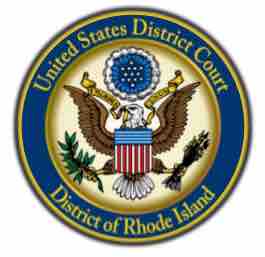Introduction
The United States district courts are the trial courts within the U.S. federal court system. There are a total of ninety-four district courts throughout the U.S. states and territories . Every state and territory has at least one district court that is responsible for hearing cases that arise within that geographic area. With the exception of the territorial courts in Guam, the Northern Mariana Islands, and the Virgin Islands, federal district judges are appointed for life.

District Court of Rhode Island Seal
Each state has at least one district court that is responsible for overseeing civil and criminal cases in a given region.
Criminal and Civil Cases
The U.S. district courts are responsible for holding general trials for civil and criminal cases. Civil cases are legal disputes between two or more parties; they officially begin when a plaintiff files a complaint with the court. The complaint explains the plaintiff's injury, how the defendant caused the injury, and requests the court's assistance in addressing the injury. A copy of the complaint is "served" to the defendant who must, subsequently, appear for a trial. Plaintiffs may ask the court to order the defendant to stop the conduct that is causing the injury or may seek monetary compensation for the injury.
Meanwhile, criminal cases involve a U.S. attorney (the prosecutor), a grand jury, and a defendant. Defendants may also have their own private attorney to represent them or a court-appointed attorney if they are unable to afford counsel. The purpose of the grand jury is to review evidence presented by the prosecutor to decide whether a defendant should stand trial. Criminal cases involve an arraignment hearing in which defendants enter a plea to the charges brought against them by the U.S. attorney. Most defendants will plead guilty at this point instead of going to trial. A judge may issue a sentence at this time or will schedule a hearing at a later point to determine the sentence. Those defendants who plead not guilty will be scheduled to receive a later trial.
Bankruptcy Court
A bankruptcy court is associated with each U.S. district court. Bankruptcy cases primarily address two concerns. First, they may provide an honest debtor with a "fresh start" by relieving the debtor of most debts. Second, bankruptcy cases ensure that creditors are repaid in a timely manner commensurate with what property the debtor has available for payment.
Other Trial Courts
While district courts are the primary trial courts within the U.S., two special trial courts exist outside of the district court system. The Court of International Trade has jurisdiction over cases involving international trade and customs issues. Meanwhile, the United States Court of Federal Claims oversees claims against the United States. These claims include money damages against the U.S., unlawful takings of private property by the federal government, and disputes over federal contracts. Both courts exercise nationwide jurisdiction versus the geographic jurisdiction limited to the district courts.